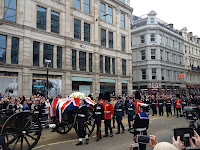 Like
many Focus members, I have lived in other countries; however in my opinion, the Brits always give
the world a master class in organizing public events. Last Wednesday, I woke up early and took the
tube to St Paul’s cathedral for Baroness Thatcher’s funeral. It was 8:30am by
the time I arrived at the front of the Cathedral and as you can imagine, I was
not alone; some people had arrived the night before in order to have a good
view of this historic event. Television crews, journalists, and photographers
from all over the world were already busy making preparations for this grand event.
All of us stood in an orderly fashion behind the barriers. There was small talk
between people in the crowd, explaining their reason for being there, while others
stood in silence.
Like
many Focus members, I have lived in other countries; however in my opinion, the Brits always give
the world a master class in organizing public events. Last Wednesday, I woke up early and took the
tube to St Paul’s cathedral for Baroness Thatcher’s funeral. It was 8:30am by
the time I arrived at the front of the Cathedral and as you can imagine, I was
not alone; some people had arrived the night before in order to have a good
view of this historic event. Television crews, journalists, and photographers
from all over the world were already busy making preparations for this grand event.
All of us stood in an orderly fashion behind the barriers. There was small talk
between people in the crowd, explaining their reason for being there, while others
stood in silence.
I
couldn’t help noticing the impeccable timing of the events that preceded the
arrival of the coffin, which was pulled by the Royal guards. Slowly but
steadily, buses started to arrive at the Cathedral with guests. Precisely every fifteen minutes there was
another arrival or there was a change in the set up of guards, security, or
the royal band. Every time there was a well known person walking up the
stairs of the cathedral, there were cheers or clapping from the crowd. By
now, we were 15 people deep from the barriers. At exactly 10:30am buses with
top VIPs arrived, at 10:45 the Queen, just as the Orchestra finished playing the
national anthem. Exactly five minutes later, the horse driven carriage
with Baroness Thatcher’s coffin draped in the Union Jack arrived, stopping in
front of the Cathedral steps. The coffin was lifted from the carriage by the
bearer party and taken up the stairs, as the church bells rang. Then, at
exactly 11:00am the doors of the cathedral were closed and the service started.
While we were obviously not allowed into the Cathedral for the service, it
ended at exactly 12 noon.
Margaret Thatcher was a stickler for punctuality, and she would have been pleased that the day’s events went to schedule. Great Britain is renowned for great displays of pomp and circumstance, and this occasion was no exception. Such are the traditions and patriotism of the British people.
By Rolando Stein
Visit the FOCUS website: www.focus-info.org





